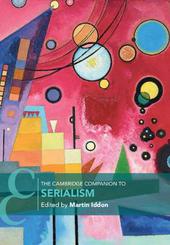
|
The Cambridge Companion to Serialism
Hardback
Main Details
Description
What is serialism? Defended by enthusiastic champions and decried by horrified detractors, serialism was central to twentieth-century art music, but riven, too, by inherent contradictions. The term can be a synonym for dodecaphony, Arnold Schoenberg's 'method of composing with twelve tones which are related only to one another'. It can be more expansive, describing ways of composing systematically with parameters beyond pitch - duration, dynamic, and more - and can even stand as a sort of antonym to dodecaphony: 'Schoenberg is Dead', as Pierre Boulez once insisted. Stretched to its limits, it can describe approaches where sound can be divided into discrete parameters and later recombined to generate the new, the unexpected, beginning to blur into a further antonym, post-serialism. This Companion introduces and embraces serialism in all its dimensions and contradictions, from Schoenberg and Stravinsky to Stockhausen and Babbitt, and explores its variants and legacies in Europe, the Americas and Asia.
Author Biography
Martin Iddon is Professor of Music and Aesthetics at the University of Leeds. He is a composer and musicologist, the author and editor of multiple volumes devoted to post-war music, including New Music at Darmstadt (2013), John Cage and David Tudor (2013), John Cage and Peter Yates (Cambridge University Press, 2019) and, with Philip Thomas, John Cage's Concert for Piano and Orchestra (2020).
|